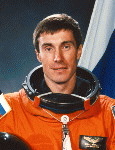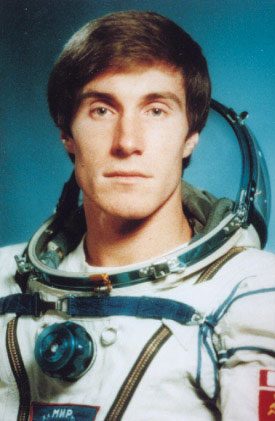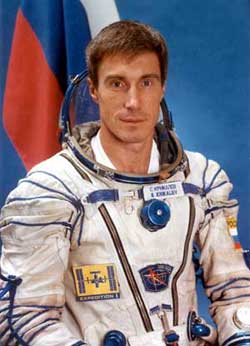RSC
Energia bio
(Jan 05) |
 Sergei
Konstantinovich KRIKALEV Sergei
Konstantinovich KRIKALEV
ISS Commander,
Soyuz TMA transport spacecraft Commander,
Cosmonaut-Researcher,
S.P. Korolev Rocket&Space Corporation Energia, Russia
DATE AND PLACE OF BIRTH: August 27, 1958, Leningrad (now St. Petersburg).
EDUCATION: In 1981 he graduated from the Leningrad Mechanical Institute
(Voyenmekh), the machine building department specializing in the Flight
Vehicle Design and Manufacturing; got the honours diploma in Mechanical
Engineering.
MARITAL STATUS: Married.
Wife: Yelena Yuryevna Terekhina born in 1956, works as engineer at
RSC Energia.
Daughter: Olga Sergeevna Krikaleva, born in 1990, goes to school.
AWARD AND RANKS: Hero of the Soviet Union, Hero of the Russian Federation,
the USSR Pilot-Cosmonaut. Awards: Gold Star Medal of the Hero of the Soviet
Union; Order of Lenin; Gold Star Medal of the Hero of the Russian Federation;
Order of Friendship of the Peoples. Awards from foreign countries: officer
of the Legion of Honour (France), the NASA Space Flight Medals (1994, 1998,
2001); the NASA Distinguished Service Medal. Awards of scientific and social
organizations: Order of Eagle First Class (Association of the Russian Manufacturers).
HOBBIES: Aerobatic flying, swimming, scuba diving, Alpine skiing, tennis,
windsurfing, ham radio (X75M1K).
WORK EXPERIENCE: Since 1981 he has been working as engineer of NPO Energia's
PDB. He was engaged in developing cosmonauts flight manuals, the proposals
for operator's data imaging on panels and displays of the Mir orbital complex;
updating flight documentation of the Salyut-7 station. In January 1984
he was selected by the test results as a candidate for the NPO Energia's
cosmonauts team.
On September 2, 1985 he was taken on the staff of NPO Energia cosmonauts
by the State Interdepartmental Committee’s resolution.
On November 10, 1985 he was appointed a candidate for test-cosmonauts
of NPO Energia's cosmonauts team by the Order of the Minister for General
Machine Building.
On February 11, 1987 he was appointed test-cosmonaut of NPO Energia's
cosmonauts team.
Since April 7, 1992 he has been instructor - test-cosmonaut, NPO Energia
Deputy Head of Department.
He was employed at Mission Control Center (MCC), at first as a radiogram
developer, then as a specialist in crew actions and flight documentation
throughout several long-duration expeditions. After loss of communication
with the Salyuit station in February 1985 he was involved in the team developing
and testing the procedure to fly to the uncontrollable station. Before
the prime crew (Dzhanibekov - Savinykh) trainings started, he had tested
various options of the procedures as part of the support crew (Viktorenko
- Krikalev).
As part of his work in the Department Krikalev took part in cosmonauts
training at CTC and Baikonur. After joining the cosmonauts team he kept
on working in the same Department as Team Lead and then as Deputy Head
of Department. During 1985-1986 he took the course of basic space training
at CTC after Y.A. Gagarin. In 1986 he was qualified as test-cosmonaut by
the Interdepartmental Qualification Committee’s solution.
In 1986-1988 he took part in the cosmonauts team training under the
Buran Program.
On March 22, 1988 as member of the crew (4th crew with Schukin) he
replaced A. Kaleri discharged from the training because of the health problems,
in the prime crew of the Soyuz TM-7.
During March 22, 1988 through November 11, 1988 he received training
as the Soyuz TM-7 prime crew flight engineer under the Prime Crew-4/Aragats
Program at the Mir OS along with A. Volkov and Jean Loup - Chretien (France).
He got training as the main tester for the first test of Extravehicular
Maneuvering Unit (EMU).
Together with A. Volkov he made arrangements for the new Kvant-2 module
acceptance and initial operational use. Under the Flight Program they received
training in space walks.
His pioneer flight took place from November 26, 1988 to April 27, 1989.
He flew as a flight engineer onboard the Soyuz-TM-7 space vehicle and Mir
OS under the Prime Crew-4/Aragats Program. The flight duration was 151
days 11 hours 08 minutes 24 second.
In 1990 he got training as a flight engineer of the Soyuz TM-11 backup
crew under the Prime Crew-8 Program and the Joint Soviet-Japanese flight
onboard the Mir OS together with A. Artsebarsky and R. Kikuti (Japan).
From December 1990 through April 1991 he received training as a flight
engineer of the Soyuz TM-12 prime crew under the Prime Crew-9 Program onboard
the Mir OS along with A. Artsebarsky and H. Sharman (Great Britain).
From May 18, 1991 through March 25, 1992 he took part in the second
space flight as the Soyuz TM-12 and Mir OS flight engineer under the Prime
Crew-9 and Prime Crew-10 Programs. During the flight he performed 7 space
walks with a total duration of 36 hours 29 min. The flight duration was
311 days 20 hours 00 minutes 54 seconds.
From November 1, 1992 through January, 1994 he got training at L. Johnson
Space Center (NASA) as a flight expert of crew No 4 carried by the Discovery
Orbiter under STS-60 Program. He completed the training and was certified
to operate the Shuttle manipulator (for grappling free-flying satellite,
including handling the satellite with loss of orientation).
From February 3 through February 11, 1994 he took part in the third
space flight as an STS-60 crewmember onboard the Discovery Orbiter in the
capacity crew-4 flight specialist. The flight duration was 8 days 07 hours
09 minutes 22 seconds.
From April 1994 through January 1995 he got training at L. Johnson
Space Center as a backup cosmonaut of V. Titov, flight specialist of the
Discovery crew-4 under STS-63 Program. Concurrently with the trainings
as a backup crewmember under STS-63, he along with NASA Astronauts Office
got down to the work related to a new international station. After studying
the US EVA spacesuit and passing the corresponding test Krikalev with the
spacesuit donned worked in neutral buoyancy laboratory on developing the
procedures to assemble the future station in space. Prior to flight he
was involved in MCC-H operations assisting in the cooperation with two
MCCs.
On February 3, 1995 he was a backup specialist of the Discovery Orbiter
flight 4 under STS-63. During the flight he was appointed Lead of the 1st
Consultative Team (the group of experts from MCC intended to work at MCC-H).
In the most critical flight phases he worked in the main operations management
room assisting in establishing communication between the two MCCs and two
crews. He performed similar services during flight STS-71, 74 and 76. As
a representative of the Lead Operational Control Team he participated in
the RSA/NASA talks on the work breakdown.
Since January 1996 he was appointed the Prime Crew Flight Engineer
of the of the first Expedition to the International Space Station (ISS-1).
The launch was scheduled for May 1998. From October 1996 he got training
together with Yu. Gidzenko and W. Shepherd (USA) as a Flight Engineer of
the ISS-1 prime crew.
In July 30, 1998 he was assigned to the Endeavour Orbiter crew under
STS-88 Program.
From September 17 through November 1998 he received training at L.
Johnson Space Center (USA) as a crewmember under STS-88.
From December 2 through December 14, 1998 he performed the fourth space
flight as a specialist of the Endeavour flight 4 under STS-88 Program.
It was the pioneer manned flight under the International Space Station
Assembly Program. During the flight toward the Zarya Functional Cargo Block
the US NODE 1/Unity Module was docked. He and the Shuttle Commander R.
Cabana were the first to open the hatches of the ISS. He took part in the
activities onboard the ISS. The flight duration was 11 days 19 hours 17
minutes 55 seconds.
From 1999 till October 2000 Krikalev proceeded with his training as
a Flight Engineer of the ISS-1 prime crew along with Yu. Gidzenko and W.
Shepherd (USA).
From October 31, 2000 through March 21, 2001 Krikalev performed his
fifth space flight under the ISS (ISS-1) first Prime Crew Program as the
ISS Pilot, Commander of the Soyuz TM-31 spacecraft and specialist of the
Discovery flight 3 under STS-102 in the recovery stage. The ISS-1 crew
reactivated Service Module Zvezda and Functional Cargo Block Zarya, received
three Shuttle Orbiters, whose crews docked to the station Solar Array R6
Module and Destiny Laboratory Module. The Destiny and Unity Modules were
reactivated, two Progress M/M1 cargo vehicles and Leonardo cargo module
were received and unloaded, scientific investigations under the Russian
and American Programs were initiated. The station was handed over to the
Expedition-2 Prime Crew. The flight duration was 140 days 23 hours 38 minutes
55 seconds. Currently he is in the process of preparation for the next
space flight as the Commander of ISS-11 Prime Crew.
SPORTING RECORDS: A first-grade swimmer; Candidate for all around combined
tournament Master of Sport (at Leningrad Championship in 1979).
From 1977 he went in for aerobatic flying. During 1980-1981 he was
a member of Leningrad Team on aerobatic flying.
In 1981 he was awarded the title of the USSR Master of Sports on aerobatic
flying.
From 1982 he went in for aerobatic flying in the Central Aeroclub after
V.P. Chkalov in Moscow.
In 1982 he took part in the USSR Championship on behalf of the Central
Aeroclub team and was a candidate for the USSR combined team on aerobatic
flying.
In 1983 he was recognized as an Overall Champion of Moscow by aerobatic
flying. In the Spartakiade finals of the USSR Nations and the USSR Championship
he stood up for the RS FSR team, where he won the third place in the team
records and the 8th place as a personal record.
In 1985 he took part in the Socialist Countries Campionship on aerobatic
flying as a member of the USSR 2nd Team and was a member of the Russian
national team on aerobatic flying by gliders. He became a Silver Prize
winner in aerobatic flying exercises.
In 1986 he won the USSR Championship and the European Championship
in the team records, as well as the champion by the exercises. Also he
was awarded the title of the International Class Master of Sports.
In 1997 he won the World Championship and the 1st Aerobatic Flying
Games in the team records. Also he became a Silver Prize winner in personal
record.
He flew aircraft Yak-18A, Yak-52, Yak-5, Yak-55M, Su-26, Su-29, L-39.
He performed familiarization flights with instructor by MIG-21, MIG-25
and TU-134.
He was granted the second pilot license to fly aircraft T-38 (USA)
and had logged more than 140 hours by this aircraft.
January 2005.
Based on materials from Gagarin Cosmonaut Training Center
and Handbook 'Soviet and Russian Cosmonauts. 1960-2000'. |
|





 Sergei
Konstantinovich KRIKALEV
Sergei
Konstantinovich KRIKALEV
 Sergei
Konstantinovich KRIKALEV
Sergei
Konstantinovich KRIKALEV